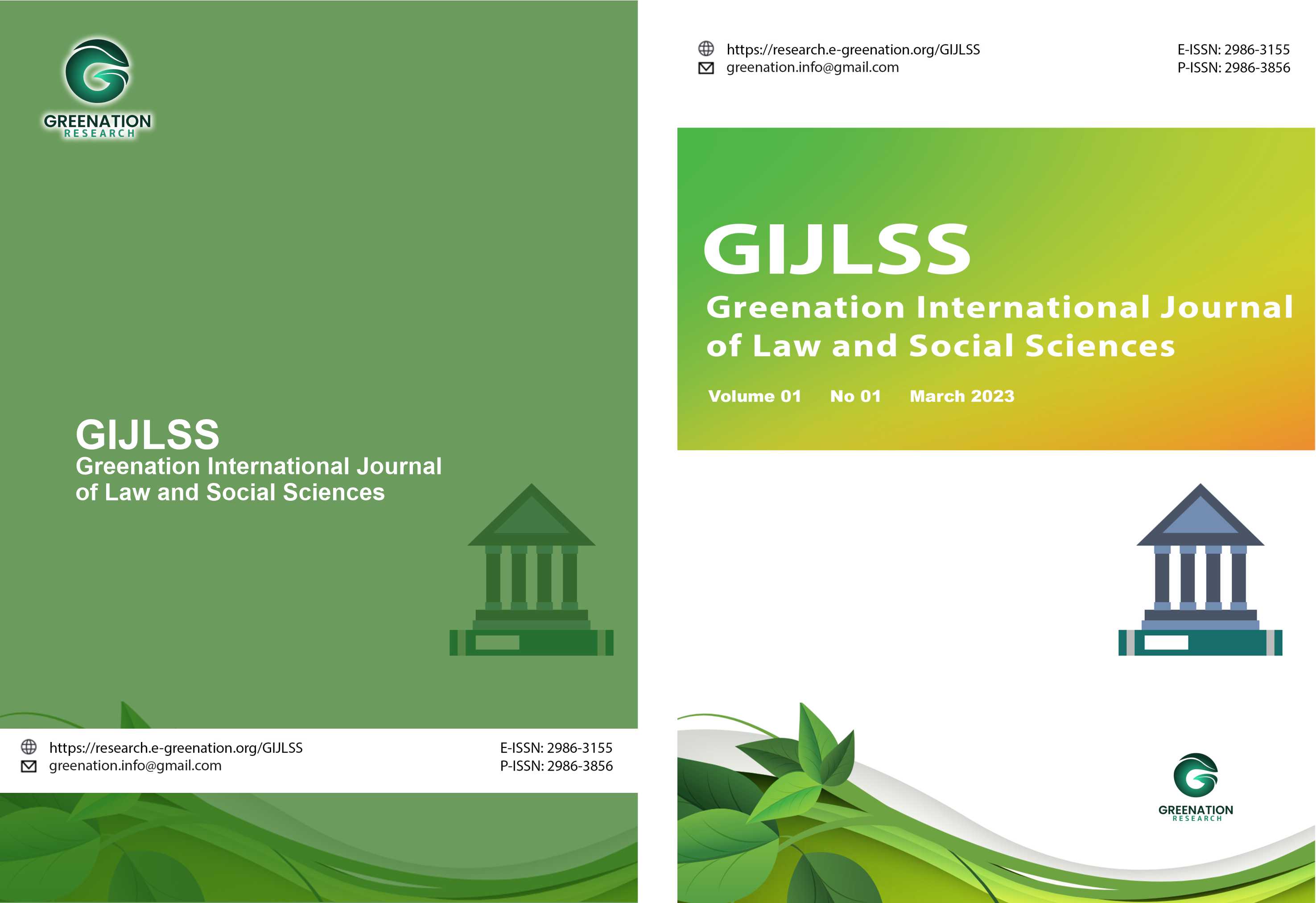Application of Blockchain Technology for Strengthening The Integrity of The Electronic Investigation Management System (E-Mp) in The Indonesian National Police
DOI:
https://doi.org/10.38035/gijlss.v3i2.487Keywords:
Blockchain, e-MP, Police, Integrity, Investigation, Personal Data, Legal ReformAbstract
This study discusses the application of blockchain technology in strengthening the integrity of the electronic investigation management system (e-MP) within the Indonesian National Police (Polri). As demands for transparency, accountability, and data security in the investigation process increase, the e-MP system faces serious challenges related to potential data manipulation, weak internal controls, and limited objectively verifiable digital footprints. Blockchain technology offers a solution with its decentralized, transparent, and immutable characteristics, thus enhancing the validity of digital evidence and preventing illegal intervention in legal processes. This study uses a normative juridical approach by analyzing recent regulations such as Law No. 4 of 2023 on the Development and Strengthening of the Financial Sector (P2SK), Law No. 27 of 2022 on Personal Data Protection (UU PDP), as well as technical provisions from the Financial Services Authority (OJK) and Commodity Futures Trading Regulatory Agency (Bappebti) regarding digital assets. The analysis results show that the implementation of blockchain in e-MP requires regulatory readiness, institutional capacity strengthening, and the development of integrated digital infrastructure. The legal implications include the need for adjustments in criminal procedural law, personal data protection, and national policy strategies in the digital law sector. This study recommends the formulation of cross-sector policies, training for law enforcement officers, and institutional cooperation to ensure the technology's implementation aligns with legal and human rights principles. With the right approach, blockchain has the potential to become a main pillar in the reform of a modern and trustworthy investigation system.
References
Andriyani, W. S. (2023). Technology, Law And Society. Makassar: Tohar Media.
Andriyani, W. W. (2025). When Data Is Everywhere. Banjarnegara: PT. Penerbit Qriset Indonesia.
Astuti, N. R. (2025). Keamanan Data dalam Revolusi Teknologi. Banjarnegara: PT Penerbit Qriset Indonesia.
Ayuni, A. D. (2024). Penggunaan Blockchain dalam Pengelolaan Data: Studi Perbandingan Indonesia dan Singapura. Pekalongan: Penerbit NEM.
Azim, M. W. (2021). Analisis Peran Pengawas Penyidikan Dalam Implementasi Elektronik Manajemen Penyidikan (E-MP) Di Direktorat Reserse Narkoba Polda Bengkulu. Student Journal of Business and Management, 4(1), 20-37.
Hanafi, M. R. (2024). Pengaruh Pengawasan dan Pelatihan Terhadap Efektivitas Pelaksanaan Elektronik Manajemen Penyidikan (e-MP) Oleh Tim Penyidik Satuan Reskrim: Studi Pada Polres Belitung Timur. Jurnal Portofolio: Jurnal Manajemen dan Bisnis, 3(2), 179-190.
Herdiyathi, A. &. (2022). Pengaruh Penggunaan Teknologi Informasi Dan Pelatihan Penyidik/Penyidik Pembantu Terhadap Optimalisasi Pemanfaatan Aplikasi E-Manajemen Penyidikan. Jurnal Portofolio: Jurnal Manajemen Dan Bisnis, 1(2), 86-96.
Irawan, D. (2023). MEKANISME PROF OF WORK (PoW) DAN DELEGATED PROOF OF STAKE (DPoS) UNTUK MAKSIMALISASI KEAMANAN, SKALABILITAS, DAN DESENTRALISASI. Jurnal Mahasiswa Ilmu Komputer, 4(1), 68-75.
Lase, S. M. (2021). Kerangka Hukum Teknologi Blockchain Berdasarkan Hukum Siber di Indonesia. Padjadjaran Law Review, 9(1).
Na'im, A. Z. (2023). Evaluasi Dampak Keberadaan Sistem Elektronik Manajemen Penyidikan (E-MP) Dalam Membantu Proses Penyidikan Di Reserse Kriminal Polres Bojonegoro. Soetomo Magister Ilmu Administrasi, 551-564.
Prawoko, A. S. (2024). PROSES PENYELIDIKAN, PENYIDIKAN DAN WEWENANGNYA DALAM HUKUM ACARA PIDANA. Synergy: Jurnal Ilmiah Multidisiplinx, 1(04), 206-216.
Putra, N. R. (2024). POLITIK HUKUM TEKNOLOGI BLOCKCHAIN INDONESIA MENUJU KERANGKA HUKUM YANG IMPLEMENTASI INOVASI DAN ADAPTASI. Hukum Dinamika Ekselensia, 6(4).
Raslin, H. S. (2021). Efektivitas Penggelaran Sistem Elektronik Manajemen Penyidikan (E-MP) Reskrim Dalam Mewujudkan Pelayanan Prima Polri. Jurnal Litbang Polri, 24(1), 30-49.
Santiago, H. F. (2023). Paruh sang OJK: rekonstruksi perlindungan masyarakat dari praktik penyalahgunaan teknologi di sektor keuangan. Bogor: Kaya Ilmu Bermanfaat.
Tripathi, G. A. (2023). A comprehensive review of blockchain technology: Underlying principles and historical background with future challenges. Decision Analytics Journal, 9, 100344.
Wahana, A. N. (2025). Peran Teknologi Transparansi dan Keamanan dalam Ekonomi 5.0 pada Blockchain. Indonesian Research Journal on Education, 5(2), 359-364.
Wattimena, F. Y. (2024). Inovasi Digital dalam Pemerintahan: Meningkatkan Keterbukaan dan Efisiensi dengan AI, IoT, dan Blockchain. Bandung: Kaizen Media Publishing.
Wibowo, A. W. (2023). Pemolisian digital dengan artificial intelligence. Depok: PT. RajaGrafindo Persada-Rajawali Pers.
Wulan, P. I. (2024). Feasibility Study of Using Blockchain Technology for Criminal Records in Central Java. IJCCS (Indonesian Journal of Computing and Cybernetics Systems), 18(4).
Yunaningsih, A. I. (2021). Upaya meningkatkan kualitas layanan publik melalui digitalisasi. Altasia Jurnal Pariwisata Indonesia, 3(1), 9-16.
Downloads
Published
How to Cite
Issue
Section
License
Copyright (c) 2025 Seno Hartono Hadinoto, Joko Setiono, Ilham Prisgunanto

This work is licensed under a Creative Commons Attribution 4.0 International License.
Copyright :
Authors who publish their manuscripts in this journal agree to the following conditions:
- Copyright in each article belongs to the author.
- The author acknowledges that the Greenation International Journal of Law and Social Sciences (GIJLSS) has the right to be the first to publish under a Creative Commons Attribution 4.0 International license (Attribution 4.0 International CC BY 4.0).
- Authors can submit articles separately, arrange the non-exclusive distribution of manuscripts that have been published in this journal to other versions (for example, sent to the author's institutional repository, publication in a book, etc.), by acknowledging that the manuscript has been published for the first time at GIJLSS.























